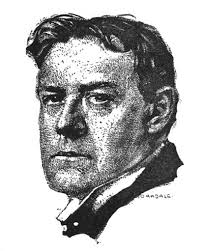Tarantella by Hilaire Belloc[1]
Do you remember an Inn,
Miranda?
Do you remember an Inn?
And the tedding and the spreading
Of the straw for a bedding,
And the fleas that tease in the High Pyrenees,
And the wine that tasted of tar?
And the cheers and the jeers of the young muleteers
(Under the vine of the dark verandah)?
Do you remember an Inn, Miranda,
Do you remember an Inn?
And the cheers and the jeers of the young muleteers
Who hadn’t got a penny,
And who weren’t paying any,
And the hammer at the doors and the Din?
And the Hip! Hop! Hap!
Of the clap
Of the hands to the twirl and the swirl
Of the girl gone chancing,
Glancing,
Dancing,
Backing and advancing,
Snapping of a clapper to the spin
Out and in —
And the Ting, Tong, Tang, of the Guitar.
Do you remember an Inn,
Miranda?
Do you remember an Inn?
Never more;
Miranda,
Never more.
Only the high peaks hoar:
And Aragon a torrent at the door.
No sound
In the walls of the Halls where falls
The tread
Of the feet of the dead to the ground
No sound:
But the boom
Of the far Waterfall like Doom.
Poet Biography
Hilaire Belloc was born in France to Louis Belloc and Bessie Rayner Parkes in 1870. After the death of his father, his mother fled with her children from France under the threat of the Franco-Prussian War (1870-1871). He was raised in England, educated at Saint John Henry Newman’s Oratory in Birmingham, served with the French artillery, and completed his degree in history at Balliol college, Oxford, with first-class honours. He married Elodie Hogan, an American, in 1896, and soon after started writing poetry and serving as an editor for publications like the Morning Post and The Eye Witness. In school he had established a reputation as an accomplished and avid debater. This aided him in his short career in politics before he turned more seriously to writing.
He was a devout Catholic, and an ardent defender of the faith, known as “Old Thunder” for his abrasive and argumentative personality and writing style. His most famous works include The Path to Rome, Europe and the Faith, and The Servile State. He also wrote a collection of satirical novels which his close friend, G. K. Chesterton, illustrated for him. He was an accomplished poet and his verse for children, such as “Rebecca, who slammed doors for fun and perished miserably,” remain cultural favourites.
Historical and Other Contexts
The title of this poem, “Tarantella,” refers to a fast-paced Italian folk dance that is often danced with tambourine in hand. The name supposedly originates from “tarantism” or the hysterical behavior (or dancing) that was thought to cure the bite of a Lycosa tarantula spider.[2] For those interested, composers Chopin, Liszt, and Rossini wrote music loosely based on this dance. The link to Chopin’s “Tarantelle in A-flat major, Op. 43” can be found below the body of this write-up.
Belloc wrote this poem for Miranda Mackintosh, a Scottish lass he met at an Inn in the Pyrenean mountains in 1909.[3] The poet travelled extensively through central Europe, and his book The Pyrenees (1909) provides an in-depth look into the history, facts of nature, practical travelling advice and general information which he gathered from his various expeditions through those same mountains.[4]
The first part of the below link features Belloc himself singing “Tarantella” as if in the quick musical style of the folk dance.
Literary Commentary
Hilaire Belloc wrote the poem in reminiscence of a beloved memory. He bittersweetly questions throughout the poem, “Do you remember an Inn, / Miranda? / Do you remember an Inn?” (lines 1-3), seemingly trying to awake the memory in the imagination of a companion. He speaks of the wretched “fleas that tease” and “the wine that tasted of tar” (lines 6-7), as well as the enjoyable “cheers and the jeers of the young muleteers / (Under the vine of the dark verandah)” (lines 8-9). As both discomfort and thrill tug at his memory, he then envisions the dance. One can almost feel the stomp of feet and clap of hands as his words paint the “girl gone chancing, / Glancing, / Dancing, / Backing and advancing” (lines 19-22). Finally, Belloc’s memory fades into the present moment and he recalls that the Inn is “never more” (line 29). The tone changes here. A rhyme remains, like an echo of the long-ended dance:
No sound
In the walls of the Halls where falls
The tread
Of the feet of the dead to the ground (lines 34-37).
Memories seem to fade, visions fade, and the sound of old folk song succumbs to the “boom / Of the far Waterfall like Doom” (lines 39-40).
More Information on Belloc can be found in the following links:
https://www.jstor.org/stable/pdf/20633417.pdf?refreqid=excelsior%3A49eed634b6697324ae72bdaade13933e
https://poets.org/poet/hilaire-belloc
https://www.poetryfoundation.org/poets/hilaire-belloc
[1] http://www.gutenberg.org/files/60663/60663-h/60663-h.htm
[2] https://www.britannica.com/art/tarantella#ref186670
[3] DOI: 10.1080/00144940309597845
[4] https://archive.org/stream/cu31924028463945?ref=ol#mode/1up











